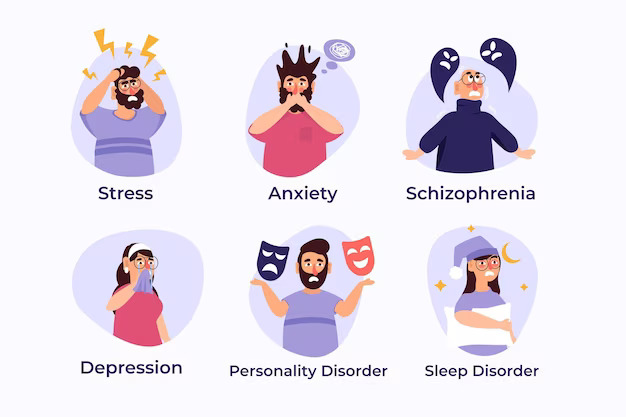
A personality disorder is a type of mental health condition that affects a person's thoughts, feelings, and behaviors, and how they perceive and relate to themselves and others. People with personality disorders typically have long-standing patterns of behavior that deviate from cultural and societal expectations and are inflexible and pervasive across different situations and contexts.
What are the types of personality disorders?
There are several types of personality disorders, and they are typically categorized into three clusters based on their symptoms and characteristics:
Cluster A personality disorders:
- Paranoid personality disorder: involves a pervasive distrust and suspicion of others.
- Schizoid personality disorder: characterized by a lack of interest in social relationships, as well as a limited range of emotional expression.
- Schizotypal personality disorder: involves odd or eccentric beliefs, behaviors, and mannerisms, as well as social anxiety and a fear of close relationships.
Cluster B personality disorders:
- Borderline personality disorder: characterized by intense and unstable emotions, impulsive behaviors, and difficulties with self-image and interpersonal relationships.
- Narcissistic personality disorder: involves a grandiose sense of self-importance, a need for admiration and attention, and a lack of empathy for others.
- Histrionic personality disorder: characterized by a need for attention and a tendency to be overly dramatic or seductive in behavior and expression.
- Antisocial personality disorder: involves a disregard for the rights and feelings of others, as well as a tendency towards impulsive and often criminal behavior.
Cluster C personality disorders:
- Avoidant personality disorder: involves social anxiety and a fear of rejection or criticism, leading to a tendency to avoid social situations and relationships.
- Dependent personality disorder: characterized by a fear of separation or abandonment, as well as a reliance on others for decision-making and emotional support.
- Obsessive-compulsive personality disorder: involves an intense need for control, order, and perfection, leading to inflexibility, rigidity, and difficulty with change.
It's important to note that each person's experience with a personality disorder is unique, and not everyone fits neatly into these categories. Additionally, some people may exhibit traits of multiple personality disorders or may have a personality disorder that does not fit into any of these categories.
How do personality disorders affect?
Personality disorders can affect individuals in a variety of ways, including:
- Impaired social and occupational functioning: People with personality disorders may struggle to maintain healthy relationships and may have difficulties in their work or academic performance.
- Emotional instability: Individuals with personality disorders may experience intense and unpredictable emotions, leading to mood swings and difficulties in regulating their emotions.
- Impulsive behavior: People with personality disorders may engage in impulsive behaviors, such as substance abuse, binge eating, or reckless driving, which can be harmful to themselves and others.
- Negative self-image: Individuals with personality disorders may have a distorted or negative self-image, leading to low self-esteem, feelings of worthlessness, and self-destructive behaviors.
- Difficulty managing stress: People with personality disorders may have a hard time managing stress and may experience extreme anxiety, panic attacks, or depression in response to challenging situations.
It is important to note that the specific symptoms and effects of personality disorders can vary widely depending on the type of disorder and the individual's unique experiences and circumstances. Seeking professional help can provide effective treatment and support for individuals with personality disorders.
What are the symptoms of personality disorders?
The symptoms of personality disorders vary depending on the specific disorder but generally involve patterns of thinking, feeling, and behaving that are unhealthy and inflexible. Here are some examples of symptoms that may be present in different types of personality disorders:
- Borderline personality disorder: intense and unstable emotions, impulsive behavior, self-harm or suicidal behavior, fear of abandonment, unstable relationships
- Narcissistic personality disorder: grandiosity, preoccupation with fantasies of success or power, a sense of entitlement, lack of empathy, envy or resentment of others
- Antisocial personality disorder: disregard for the rights of others, lack of remorse, deceitfulness, impulsivity, aggressiveness, irresponsibility
- Avoidant personality disorder: social inhibition, feelings of inadequacy, hypersensitivity to criticism, reluctance to take risks, avoidance of social or work activities
- Obsessive-compulsive personality disorder: perfectionism, preoccupation with order and control, excessive devotion to work or productivity, rigidity, difficulty making decisions
How to overcome personality disorders?
Overcoming personality disorders can be a challenging process that requires professional help and dedication. Here are some actions that could be useful:
- Seek professional help: The first step towards overcoming personality disorders is to seek help from a mental health professional. A therapist or psychiatrist can help you identify the type of personality disorder you are experiencing and provide appropriate treatment.
- Attend therapy sessions: Therapy is a critical part of treating personality disorders. It can help you learn new coping skills, identify negative patterns of behavior, and develop healthier relationships.
- Practice self-care: Engaging in activities that promote self-care, such as exercise, meditation, and healthy eating, can help you reduce stress and improve your overall well-being.
- Join a support group: Support groups can provide a safe space to discuss your experiences with others who are going through similar challenges.
- Develop healthy relationships: Building healthy relationships with others can help you learn to trust and rely on others for support.
- Take medication as prescribed: In some cases, medication may be prescribed to help manage symptoms associated with personality disorders.
In conclusion,
A person's life may be significantly affected by personality disorders, which are difficult mental health illnesses. There are different types of personality disorders, each with its own set of symptoms and treatment options. Seeking professional help is essential for individuals struggling with a personality disorder as it can provide the necessary support and guidance to manage their symptoms effectively.
On TalktoAngel, you can find the best mental health professionals. With the help of a search engine, you can locate the help you need. “ONLINE COUNSELLING FOR PERSONALITY DISORDER” or best psychologist in India

No comments yet